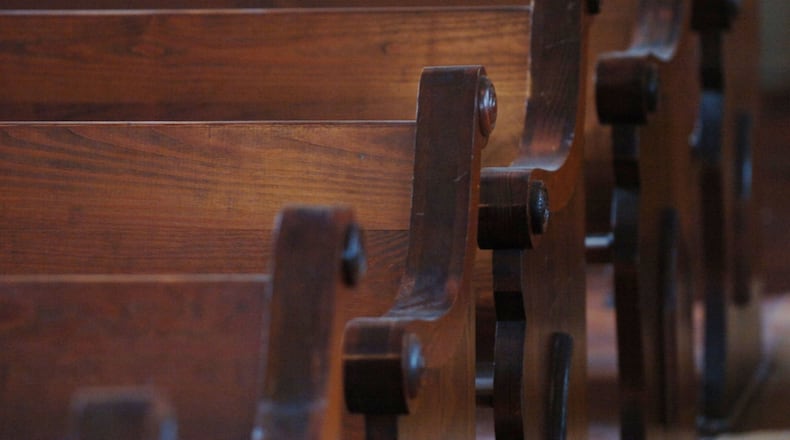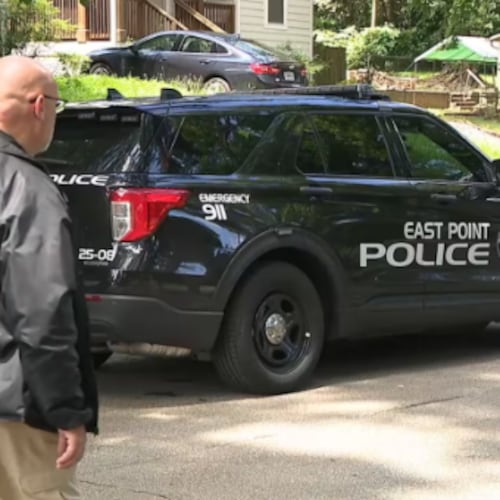The Rev. Kenneth L. Samuel invites same-sex couples to marry at Victory for the World Church in Stone Mountain, but so far no one has asked for a ceremony on church property.
He hopes that will change if the U.S. Supreme Court, in a ruling later this month, decides that gay couples have a constitutional right to marriage.
At the other end of the pew, so to speak, is the Rev. Bryant Wright, senior pastor of Johnson Ferry Baptist Church. Wright says he won’t allow two men or two women to wed at the Marietta church, no matter what the court decides.
“God’s word is about marriage being between one man and one woman,” Wright said. “That is starting with the first marriage in Genesis 2 with Adam and Eve.”
The two pastors find themselves with differing views on the issues of same-sex marriage and homosexuality, which have divided churches and denominations for years.
Eight years ago, for instance, Samuel lost more than 60 percent of his church’s membership when he took steps to make Victory for the World more welcoming and affirming for the LGBT community. Few returned.
“This is still a very controversial issue, especially in black church circles,” said Samuel, whose church now has about 2,000 members. “In most black churches, being gay is still denounced. If you’re going to be an open and affirming church in the black community, it’s a minority stance. The majority of churches and pastors believe that being gay is not in the will of God.”
Mainline progressives vs. evangelicals
It seems churches have not been as split over an issue since divisions over the civil rights movement, the role of women in the church and abortion.
“The faith community is very divided” with regard to same-sex marriage, said Ed Stetzer, executive director of LifeWay Research, an evangelical research firm. “Mainline progressives are very much on one side and evangelicals tend to be on the other.” This, even as polls suggest there is a cultural shift in how some Americans view the issue.
For instance, millennials tend to be less bothered by gay marriage, which is legal in 36 states and the District of Columbia. A recent Pew Research Center poll found that support for legalizing gay marriage is at its highest point in nearly two decades.
“The more you go to church, the less you have shifted on the LGBT issue,” he said. And while some church hierarchies, for instance the Roman Catholic Church, have not swayed in their thinking, “for the rank and file, it’s a difference scenario. Many Catholics, particularly those who attend church less regularly, have shifted.”
Among White evangelical Protestants, while 27 percent favor allowing same-sex couples to wed, an overwhelming 70 percent oppose it, according to the Pew study.
By contrast, according to Pew, a slight majority of Catholics (56 percent) and white mainline Protestants (62 percent) support same-sex marriage.
‘The Lord will touch their hearts’
In 2012, the Right Rev. Robert C. Wright, bishop of the Episcopal Diocese of Atlanta, wrote a letter to clergy allowing them to perform blessings of same-sex couples.
The letter states that a priest is not obligated to perform a blessing and, in fact, may decline to preside at one without fear of penalty.
If a couple’s desire to have their union blessed at the parish is “vehemently opposed,” the bishop must be consulted. Wright himself blessed the marriage of two women last September at Church of the Epiphany in Atlanta, with Rector Benno Pattison. The couple married earlier in New Mexico.
That’s not likely to happen with the Rev. Garland Hunt , senior pastor of The Father’s House in Norcross. He has led services in which members pray for each Supreme Court justice by name, asking that “the Lord will touch their hearts and (make them) sensitive to the biblical foundation for the institution of marriage.”
The issue took center stage this past week during the Southern Baptist Convention annual meeting in Columbus, Ohio.
Russell Moore, an ordained minister and president of the SBC’s Ethics & Religious Liberty Commission, said in a statement that regardless of how the court rules, “Southern Baptists will remain steadfast. As Christians, we believe that the state did not create the family, and cannot recreate it, so we appeal to the Supreme Court to recognize and to stay within the limits of its authority.”
‘The battle is lost in the broader culture’
Although many Christian conservatives and evangelicals still feel strongly about gay marriage, they also seem resigned that the high court will rule in favor of such unions.
Douglas Jacobsen, distinguished professor of church history and theology at Messiah College in Mechanicsburg, Pa., said the rhetoric on the religious right has changed from “trying to promote Christian values to trying to protect Christian values. Even some conservative evangelicals are realizing they don’t have the influence to get things done. They’re still opposed to it, but they realize gay rights are going to be expanded in America.”
The Supreme Court can force states to sanction gay marriage, but it can’t force churches to do the same.
“While some conservative Christians are going to fight gay marriage to the bitter end, many others sense that the battle is lost in the broader culture,” said David P. Gushee, director of the Center for Theology and Public Life at Mercer University. “They will simply ask that they not be forced to violate their consciences by having to perform gay weddings. Such religious liberty should be protected.”
“It’s up to each denomination, clergy and church to decide whether this fits under their teachings, and that’s the case whether you’re talking about a Jewish rabbi, (Muslim) imam or Buddhist monk,” said Margaret Aymer, an ordained teaching elder in the Presbyterian Church and associate professor of New Testament at the Interdenominational Theological Center.
“I doubt people are going to be looking to get married in places where they’re not welcome,” said Aymer, who is scheduled to perform a church wedding for two women in November. “We didn’t have a huge rush of people going to get married in racist white churches when the Supreme Court ruled in favor of Loving, which was 48 years ago.”
Loving vs. Virginia was a landmark case in which the Supreme Court legalized interracial marriage.
Next? How anti-gay discrimination is treated
After the gay marriage issue is settled, other issues will continue.
“The next frontier is precisely whether discrimination against gay people will be treated under U.S. law as parallel to racial discrimination or according to some other comparison,” said Gushee, the Mercer theology center director. “If it is treated as parallel to racial discrimination, then the law will bear down very hard on any form of sexual-orientation discrimination by any person, business or organization, including religious ones. In other words, there would be little or no religious liberty protection.
“Some gay-rights activists are pushing for this treatment of anti-gay discrimination,” said Gushee. “Others would settle for an approach that would allow greater religious liberty protection.”
Meanwhile, some pastors are preparing to celebrate what they hope will be an affirmative ruling. St. Luke’s Episcopal Church in Atlanta, for example, will hold a special service at 7:30 p.m. on the day decision is announced — if it’s favorable.
Others, of course, are praying for an altogether different outcome.
About the Author
Keep Reading
The Latest
Featured




